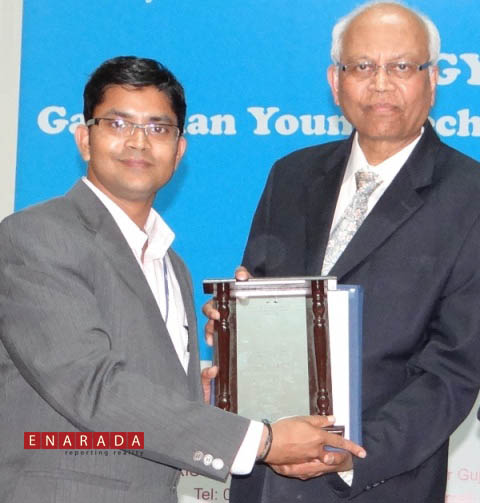
ENARADA, Mysore, April 22, 2014
MR Rajeev Ranjan, a junior research fellow at the Mysore based CSIR-Central Food Technological Research Institute, Mysore, has bagged the 2014 Gandhian Young Technological Innovations (GYTI) Award.
According to a CFTRI press release issued here today, he gets the award for designing “Jaivik Prakash (biophotonics): A Simple Tool for Detection of Hazardous Materials and Sanitary Condition at Rural Level”.
The Award is instituted by SRISTI (The Society for Research and Initiatives for Sustainable Technologies and Institutions).
Using Rajeev Ranjan’s invention, presence of very low levels of pollutants like mercury, cadmium, arsenic and 2-4 dichlorophenoxyacetic acid (a remnant of pesticides) can be detected.

Within half an hour the device can show the presence of up to 2 ppm of mercury, 4 ppm of arsenic, 16 ppm of cadmium and 100 ppm of 2-4 dichlorophenoxyacetic acid. Besides, it can also detect presence of 100 CFU (colony forming units) per ml of bacteria in samples of food, milk and fruit juice. The device has been designed using a marine luminescent bacterium and Lucifer in extracted from a new kind of firefly, the release added.
The present innovation deals with construction of immobilized robust biophotonic bead using P. leiognathi, a marine luminescent bacterium isolated from Indian coast for their application in monitoring of environmental toxicants. These biophotonic beads were used as a rapid and reliable optical biosensing tool for the detection of heavy metals [Hg(II), As(V) or Cd(II)] and pesticide [2,4-dichlorophenoxyacetic acid (2,4-D)] in water systems. The time taken for the detection of heavy metals and pesticide was less than 30 min. A highly sensitive and portable bioluminometer was also developed for the determination of microbial contamination in food and water.




